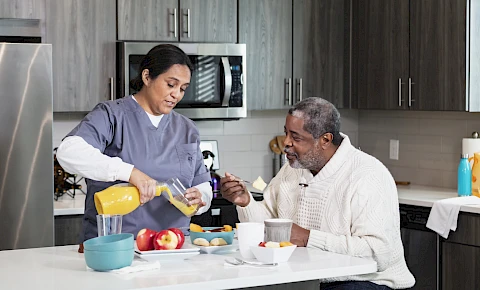
Food safety management is critical for elderly loved ones as their immune system weakens, leaving them more vulnerable to foodborne illnesses. With September marking National Food Safety Month, it's the perfect opportunity to enhance our knowledge of crucial protection practices when handling food.
Nutrition Security Needs for Seniors
As we grow older, our bodies experience changes that can influence our interaction with food. Aging impacts our digestive and immune systems, along with our taste and smell senses. This makes older adults more susceptible to foodborne illnesses. These factors highlight the importance of food safety management for elderly retirees.
Handling, Storing, and Reheating Leftovers
Safe food handling practices are essential to prevent foodborne illnesses. Proper storage and reheating, along with basic hygiene measures, can significantly reduce the risk of contamination.
- Storage: Refrigerate leftovers within two hours of cooking and set the fridge to 40°F or below. Use shallow containers for quick and even cooling. Label leftovers with the date and consume them within 3-4 days or freeze them for more extended storage.
- Reheating: Reheat leftovers to an internal temperature of 165°F. Use a food thermometer and stir food during reheating to ensure even heating.
- Hygiene: Wash hands and surfaces before handling food. Keep raw meat, poultry, and seafood separate. Use separate cutting boards and utensils.
- Healthy Lifestyle: Maintain a balanced diet and stay hydrated to support a strong immune system.
Following these strategies can significantly reduce the risk of foodborne illnesses and enjoy safe, delicious meals.
Common Misconceptions About Dietary Sanitation
Food safety management is essential to prevent foodborne illnesses. Many people hold myths about nutrition security, leading to potentially dangerous practices.
- Appearance and Smell: Food can be contaminated with harmful bacteria even if it looks and smells fine.
- Room Temperature: Leaving food out at room temperature for extended periods can lead to rapid bacterial growth.
- Freezing and Bacteria: Freezing can stop bacteria growth but does not kill all bacteria. Handle thawed food with the same care as fresh food.
Get More Help Managing Meal Times
Food safety management is critical for older adults, encompassing proper food storage, careful reheating, and dispelling myths. Adhering to these guidelines can significantly lower foodborne illness risks. For tailored support, including kitchen assistance, reach out to Senior Helpers Fort Lauderdale. We're committed to exceptional care for the elderly in Fort Lauderdale, Pompano Beach, and Coral Springs, ensuring you dine safely and confidently.